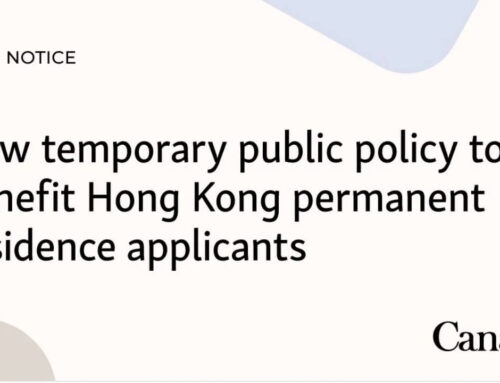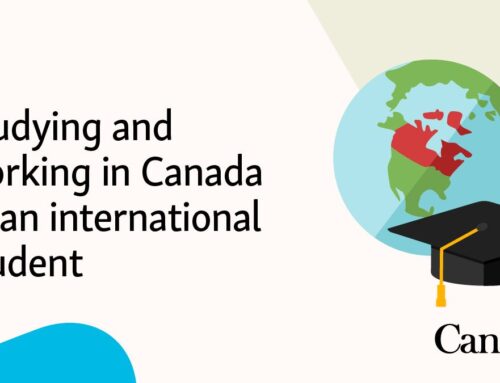Canada Pauses the Issuance of New Study Permit Applications until March 31, 2024
The recent announcement from Immigration, Refugees and Citizenship Canada (IRCC) decreasing the number of new international student permits issued in 2024 has caused confusion amongst new and existing international students in Canada. IRCC has announced that there is now a pause on the intake of new study permit applications, until the provinces come up with a system to allocate the number of study permits. Although there is a pause on intake, all applications received up until January 22, 2024, will be processed regularly.
Federal Immigration Minister Marc Miller indicated the cap will last for a period of two years. The number of permits to be issued in 2025 will be reassessed at the end of this year.
How Canada is Capping International Students
In order to implement the cap of 360,000 new study permits for 2024, IRCC is creating a provincial and territorial allocation model, with caps based on population. IRCC is will rely on provinces and territories to help implement the change and to decide how study permits will be distributed among universities and colleges in their jurisdictions. Unless provinces act quickly, there are likely to be no new study permit applications until at least March 31st, 2024. This new rule will not affect cap-exempt study permits.
IRCC told The Globe and Mail that at the end of December, there were 1,028,850 study permit holders. Of the more than one million study permit holders – who include school, college and university students and those pursuing “other studies” – over half were in Ontario, with a total of 526,015 international students, 202,565 were in British Columbia, and 117,925 were in Quebec. There were only 10 international students studying in Nunavut and 18,695 in Saskatchewan.
Here are enrolments for 2023 broken down by province:
Ontario: 526,015
British Columbia: 202,565
Quebec: 117,925
Alberta: 63,425
Manitoba: 28,190
Nova Scotia: 26,610
Saskatchewan: 18,695
New Brunswick: 16,030
Newfoundland and Labrador: 7,430
PEI: 5,355
Minister Miller said the goal of this change is to target institutional “bad actors” — small private colleges that are taking advantage of international students at under-resourced campuses while charging high tuition fees. Canada has been greatly impacted by the growing numbers of international students and the effects on the housing market. While the cap will result in a 35% reduction in new study permits, some provinces could have a total permit reduction of about 50%. On the other hand, some provinces may be able to bring in more international students than before the cap because of its population and current permit allocation. Each province and territory will be allotted a portion of the total, distributed according to population. The result will be a lower number of new study permits for provinces where the international student population has seen the most unsustainable growth.
Provincial Attestation Letter
In addition to the cap, the federal government will also require international students applying for a study permit to provide a provincial attestation letter (PAL) from a province or territory. Before IRCC’s recent announcement, international students were only required to obtain a Letter of Acceptance (LOA) from a Designated Learning Institution (DLI) before applying for their study permit.
As of January 22, 2024, IRCC says that “every study permit application submitted to IRCC will also require an attestation letter from a province or territory.” Note, attestation letters must be submitted to IRCC alongside, not in place of, an LOA from the Canadian DLI an international student hopes to attend. If a PAL is not included in the study permit application and the potential international student does not qualify for an exemption, as mentioned below, their application will be withdrawn and not accepted for processing. The department will refund any processing fees that have been paid. In other words, the PAL must be in hand before applying for the study permit and a new one is required for every new application.
IRCC hopes that the process of having PAL’s will serve as additional proof of a study permit application’s legitimacy, further protecting the integrity of Canada’s international student system. Provincial and territorial governments are being given until March 31st, 2024 “to establish a process for issuing attestation letters to students.”
Provinces and territories across Canada will not be allowed to re-allocate their numbers to another province. The allocations will be reconsidered every year.
Are there any study permit applications after January 22nd that are exempt from this new cap and process?
According to IRCC, the following students are exempt and/or will not be affected by this change:
- Extensions – Current students or those seeking study permit renewals,
- Individuals holding valid work permits, or temporary residence permits (more than 6 months) and are changing status to study permit,
- Study programs under 6 months
- Students enrolled in a master’s or doctoral program, and
- Minor children applying to attend primary or secondary school (kindergarten to grade 12);
IRCC has not decided whether Restoration applicants will require a PAL. Once a determination has been made, it will be published on the IRCC website.
Changes to Post-Graduate Work Permit and Open Work Permits for Dependents
As of September 1, 2024, international students who begin a program that’s part of a curriculum licensing arrangement (one where a private college has been licensed to deliver the curriculum of an associated public college) will no longer be eligible for a post-graduation work permit.
Graduates of master’s and other “short graduate-level programs” will “soon” be able to apply for a three-year work permit, the government says.
Spouses of all international students who are in master’s and doctoral programs will remain eligible for spousal open work permits (SOWP); everyone else will not be eligible. Open work permits will also be made available to the spouses of international students in master’s and doctoral programs.
Current SOWP holders will be able to extend their status inside Canada if the study permit holder also extends their status inside Canada.
When will these new changes come into effect?
IRCC has implemented the new study permit cap, and the attestation letter process starting from January 22nd, when the initial announcement was made. This means that, through the remainder of the year, only 360,000 study permit applications will be approved.
What may cause some confusion, however, is that the process for provincial and territorial governments to issue attestation letters has yet to be finalised. Provinces and territories have until March 31st, of this year, to implement this process.
How will New Students Holding a Letter of Acceptance be Impacted?
The new changes to the international student program extend to anyone who did not submit their study permit application before January 22nd, 2024. Therefore, even if a student holds a letter of acceptance (LOA) for study at a Designated Learning Institution (DLI), unless they have already applied for their study permit prior to January 22nd, they will be subject to the new policies.
Will Applications for New Study Permits be Processed Prior to March 31st?
With the limited information being provided by the Canadian government regarding the new policy, it remains unclear whether international students will have to wait until the end of March to apply for their study permits.
The backlog of applications will be at the provincial and territorial levels as it is their responsibility to develop a process for issuing attestation letters to international students. So long as provincial/territorial governments can establish the allocation before March 31st, international students may be able to apply for their study permits sooner.
Will I have to get IRCC approval if I want to switch my educational institute in 2024?
As of now, it is unclear what the process will be for international students who wish to change their DLIs in the coming year. IRCC may likely provide more clarity on this as the year continues.
Is this a permanent change to the international student program?
Per the January 22nd release, the new international student cap and attestation letter process is a temporary measure, that is set to be in effect for the next two years. IRCC has stated that it will reassess the cap imposed on international students for 2025 at the end of this year.
Sector Responses to Canada’s New Study Permit Cap
Since the January 22nd announcement, additional information has been posted by various provincial / territorial schools, as well as international post-secondary education networks.
International education sector stakeholders have responded to Canada’s recently announced two-year cap on study permits, with concerns expressed regarding the country’s reputation as a welcoming destination, visa applications in the short term and the changes in work rights. For example, in a recent article from the Study Travel Magazine, Colleges and Institutes Canada (CICan) said it appreciated IRCC efforts to safeguard the integrity of the International Student Program but expressed concerns.
“This approach, characterised by Minister Miller as a ‘blunt instrument’, will have far-reaching consequences across the sector, especially in key regions, including the possibility of layoffs, closures and increased tuition fees – all of which will inevitably affect both Canadian and international students.”
The Canadian Bureau for International Education (CBIE) said that “policies need to be recalibrated” and that bad behaviour by a minority of actors should be penalised, but that defining what constitutes a sustainable level across diverse communities was a complex undertaking.
The association said that the “sweeping cap” could have “serious unintended consequences” and jeopardise the benefits that many communities reap from international education.
Peter Halpin, Executive Director of the Association of Atlantic Universities, told Global News that members were concerned that the cap could undermine work to make the region an attractive destination, given that around 30 per cent of their students are international, compared with a national ratio of around 20 per cent.
Universities Canada also issued a response to the cap: “We anticipate the need for letters of attestation from each province could significantly affect processing times, which could lead to students choosing to pursue post-secondary study in other countries.”
The Government of Alberta has posted the following on their website:
International students applying for a study permit to attend an undergraduate program in Alberta will be required to submit an attestation letter along with a letter of acceptance to a qualified Alberta post-secondary school. Alberta will establish a process for issuing attestation letters to students by March 31, 2024.
Ontario
Ontario’s post-secondary sector has become increasingly reliant on the high tuition fees paid by foreign students and has recruited them in staggering numbers.
Federal data shows about 240,000 permits granted to international students for post-secondary education in Ontario in each of the last two years. Those numbers are to be cut by 50%, according to Minister Miller.
CBC reports that at Ontario’s universities, international students accounted for about one-sixth of total enrolment in undergraduate programs in 2021-22, the most recent year for which data are available. In addition to those 69,000 international undergraduates, there were another 23,000 foreign students in graduate programs, such as masters and doctoral degrees.
In a January 25th Statement by Ontario’s public colleges on the imposed cap on study permits, the colleges claim that the federal government’s process is too rushed. The imposition of an immediate requirement for a letter of attestation from the provincial government is halting all student visa processing right now, as the provincial government currently has no process for generating such letters. They are calling for the federal government to delay the implementation of the requirement for a letter of attestation until such time as provinces can put a process in place. That is only fair to the students and to the employers who are counting on them.
Nova Scotia
Although Nova Scotia’s Advanced Education Minister issued a statement saying it’s too early to speculate on the potential impacts of the recent international student cap, with its current student population, Nova Scotia is likely to suffer with the new cap. According to a January 26th article from Yahoo News Canada, if Nova Scotia was to get 2.5% to match its share of the national population (roughly 1 million of Canada’s 40 million people are Nova Scotians), that would be 9,000 permits. The Association of Atlantic Universities reported in October, 2023 that there were over 6,700 international students enrolled across Halifax’s six universities, with the majority enrolled at Dalhousie at 4,175, followed by Saint Mary’s at 1,639. At Dal and SMU, between 20 and 25% of their student populations are international students.
British Columbia
In a report by The Canadian Press published on January 29th, 2024, British Columbia’s post-secondary education minister, Selina Robinson says no new institutions will be allowed to enrol international students for two years as the province seeks to eliminate “exploitive practices” in the field. The pause is expected to last until February 2026.
Robinson also announced the province was setting minimum language requirements at private institutionsso international students will be “better prepared” before coming to B.C.
She said in a release Monday that there would be more frequent inspections of schools to ensure standards are met, adding that many students are being taken advantage of.
“That’s why we’re introducing more stringent requirements for institutions and robust safeguards to protect international students against bad actors, provide them with a better path to success, and make sure B.C. continues to attract the talented students we need to fill significant gaps in the labour market and drive our economy forward,” she said.
New standards would include “higher assessment criteria for degree quality, demonstrated labour-market need for graduates and appropriate resources, and student supports,” the statement said.
Institutions would also be required to post tuition costs for the whole time someone is studying.
“This ensures incoming students know the entire costs of their education before they start their program,” the statement said.
On the other hand, in an interview with CBC News, B.C. Premier David Eby said he is pressing the federal government to bend on its new cap on international students, after learning of the significant reduction in the number of foreign postsecondary spaces that his province will be able to fill in the coming year.
He said the province wants some exemptions to allow more international students in some high-demand fields such as truck drivers, nurses and early childhood educators.
“We can’t have this cap impacting our health care system or the availability of childcare, or the ability to build the homes that we need,” he told reporters.
The Premier also said he agrees with Ottawa that there are too many international students coming to Canada, but he wants the reductions made “in a way that minimizes harm to the overall provincial economy, to postsecondary institutions, and to international students themselves.”
It said B.C. has more than 175,000 international post-secondary students from more than 150 countries, out of a total 545,000 post-secondary students in public and private institutions.
About 54 per cent of international students are in private post-secondary institutions, according to statement.
New Brunswick
In a recent newspaper article from CBC, Arlene Dunn, the minister of post-secondary education and the minister responsible for immigration, said in a statement these are not issues in New Brunswick.
“The changes are very concerning for our government, and we are not in favour of this move that unfairly targets all provincial jurisdictions when not all are experiencing the same problems,” said Dunn, adding that New Brunswick “is paying the price for the problems that exist in other parts of the country.”
Manitoba
During a recent press conference in Neepawa, Manitoba Premier Wab Kinew said he is still waiting to hear from Ottawa on the matter: “We have asked, but they don’t have answers for us yet,” he said.
“Of course, we need to be able to house and have the right programs and ensure a quality education for these folks coming to Manitoba. But if there’s a reduction … potentially, it’s going to put an upward pressure on tuition here.”
This alert is for informational purposes only. If you have any questions, please contact us via email at info@poonahimmigrationlaw.com for further information.





